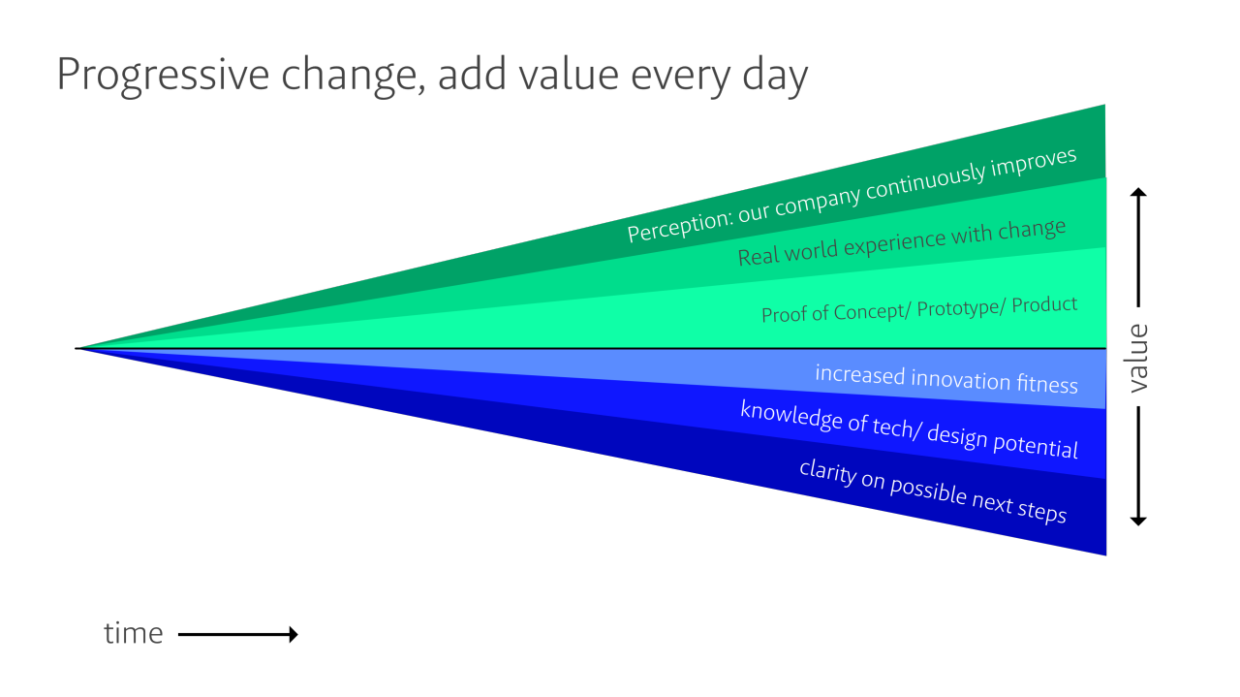So for a long time now I try to offer our services via LinkedIn, but apparently their forms have never heard of ‘customer experience’, or ‘service design strategy’, or ‘experience innovation’ and ‘enterprise design’. That’s why I decided to work on a couple of articles 🙂 Because everything related to smart change is exploding, with Europe and The Netherlands as the epicenter. It is the biggest trend that’s going to hit your industry soon, wether you like it or not! Let’s dive in how this is relevant to you.
An interesting trend in our region is that commodity services like development and even design are being outsourced to countries outside of Europe. It’s just plain cheaper. Heck, the company I work for is actually one of the first movers in this field. So what’s left if the things we used to do are now ‘scalable services’? Something cooler and even more powerful: introducing the blueprint and fitness for corporate agility, leading to a better value exchange with your company and people.
“Isn’t this innovation? We already got an innovation department!” you might say.
Well, you might need something more than that to truly and meaningfully progress. Innovation is incidental change. It’s sprinting a marathon without training. We’re talking being able to leverage change as a constant to create value that’s unique for your brand. We’re talking applying innovation by stacking multiple disciplines into a new proposition, or multiple companies, or multiple industries.
Yeah, but why?
For long design, branding, mobile development, cloud services and UX was our bread and butter. But the robots and cost cutters have made these services into a commodity! That is, on production level. Every company and their mother has a partnership with parties that execute on their digital tactical needs, but there is a need for direction and sustainable value exchange. That’s where we need something new. A smart driver for sustainable change. The ability to adopt fast, without much pain.
These days European companies are more and more pressured to lower their cost, automate and externalise risk. This race to the bottom will end and it can only end in disappointment and some systemic failure, because this ultra focus on minimising also makes us blind for opportunity. Most European will need to work the problem from two ends: look what you can do smarter now AND move to where you can add value tomorrow.
Return to the core: intuitive, agile and human change
To add value tomorrow we are unlearning the foundation of our success and and focus on out classing, out value, out love and out innovate any competition. More importantly: finding our core super powers and setting the volume to the max. Really connect and evolve WITH the new opportunities and challenges. AND that’s where I live, where digital professionals in Europe can actually make the difference.
Purely from a standpoint of our living standards, expense and expectations of our surrounding brands to adapt on any whim, new reality, or just plain evolution, we should be doing this as wel! That’s where our industry flourishes: Look to the now, extrapolate, talk, design and act to the future and build on tomorrow.
Progressive innovation: hack today, improve tomorrow, refine indefinitely.
I would press upon any financial institute, B2B company, (health) care organisation, travel organisation to start the conversation with us, dream the big dream: What if you would start all over again and take bold steps? Now is the time to recalibrate everything you held to be true, because most likely, cost, customer and ecosystem will change, or has changed so much that your business will be incompatible.
Start building on new standards, legislation and refactor to be compatible for an open connected future. Start blueprinting your next step, discover partners and find allies, intertwine your business with others by data weaving, dialogue and open all doors and windows for others to participate.
Do you need a big visionary document? No, you need to incorporate the skills and power of a visionary in your company. Those skills are: discover, hack, try, make a refine. Most of all: discard. Take an example to IBM: focus on and get practice with future sustainability, be a good economic and cut losses as soon as possible, but also: try again, do better, be better.
